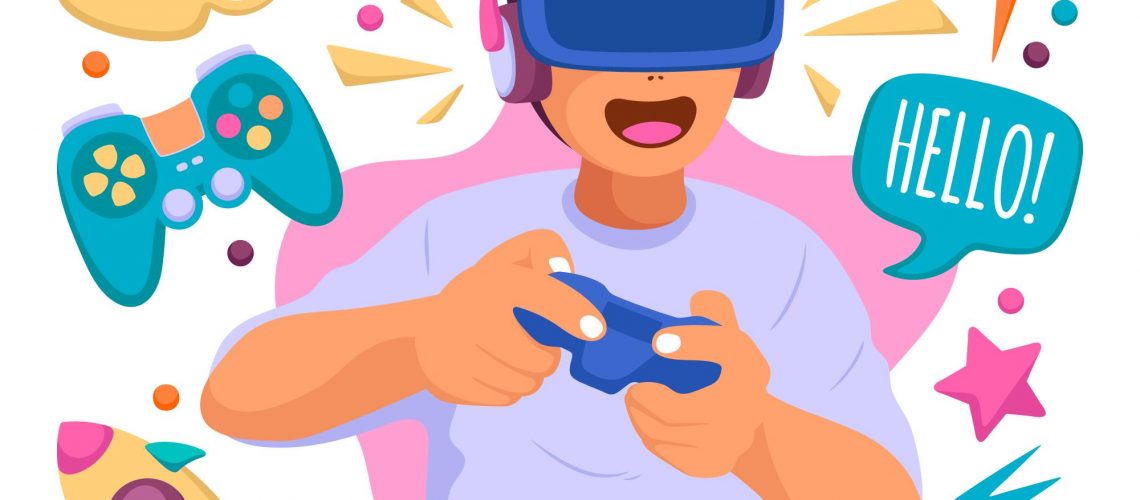Digital technology is currently advancing rapidly , this generation of teenagers mostly use gadgets to play online games and are addicted towards them. In order to keep them busy in other ways like offline engagement with sports and education, it is impossible to shield them from gadgets. A gradual increase in online game addiction can change thinking and behavioural patterns that lead to an entire focus shift towards games rather than studies.
Games like Momo Challenge, Player Unknown Battleground (PUBG), Blue Whale Challenge, and many more have already impacted many precious lives. Most pre-teens and teens behave as if they can’t live without such games. These games are played in big groups and have been creating great levels of addictions and confusion in their lives.
Despite the popularity of online gaming in India, there have been no formal dedicated studies on the negative psychosocial impact. American Psychiatric Association notes that symptoms like preoccupation with gaming, withdrawal symptoms when gaming is taken away or not possible (sadness, anxiety, irritability, suicide and substance addiction), inability to reduce playing, unsuccessful attempts to quit gaming, giving up other activities, loss of interest in previously enjoyed activities due to gaming, etc., can indicate a potential gaming addiction.
Your Addiction, their Monetisation:
Apart from addiction, the core opportunity for the fraudsters is that they monetise their activities like buying and selling virtual currencies and artefacts like skins, weapons and armour, etc., thus creating an opportunity to offer fraud schemes such as money laundering and payment fraud, which happens mostly on free-to-play online multiplayer games.
Several monetisation options, particularly in free-to-play online multiplayer games, include (a) in-app advertisements. (b) In Game product. (c) Incentive based advertisement (c) Purchase/Pay per download. (d) Premiums and upgrades. (e) In App purchases (f) Free Subscription.
Most Common Gaming Frauds
The online gaming world is not only a fun place but also a target for manifold frauds. This fraudulent activity results in potent financial, emotional, and security harm to players. Below are the most common prevalent types of fraud in online gaming
Account Hacking – Getting unauthorised access to a player’s gaming account. Hackers often use phishing attacks, weak passwords, or malware to compromise an account
- Impact – (a) Loss of in-game assets and currency (b) Unauthorized transactions (c) Will lose access to the gaming account
- Prevention (a) Use strong, unique passwords (b) Activate 2FA (Two-Factor Authentication) (c) Be on the lookout for phishing attempts and questionable links
Phishing Scams – Scams in this category involve false messages or websites, which might mimic real gaming platforms to steal login credentials or personal information
- Impact – (a) Identity Theft (b) Account hack (c) Financial loss
- Prevention – (a) Verify the Emails and Websites are Legitimate (b) Avoid sharing personal information (c) Make use of the official channels to communicate about game-related matters
In-Game Item Scams – Players are scammed to trade good in-game items or currency for something worthless, usually through fraud. In most cases, this can be misleading advertising about rare items or big rewards.
- Impact – (a) Loss of valuable in-game items (b) Emotional distress
- Prevention – (a) Trade with trustworthy players (b) Verify Offers and Discounts before Trading (c) Use official trading platforms where it is possible
Bogus Game Downloads and Updates – Scammers duplicate well-known games or releases and create fake versions with embedded malware, which could steal personal information, spy on users, or damage their devices.
- Impact – (a) Malware infection (b) Data Theft (c) Device performance issues
- Prevention – (a) Download games and updates only from official sources (b) Utilize antivirus software (c) Do not click on pop-up ads and links of dubious nature
Credit card fraud – Fraudsters get their hands on the credit card information of players through hacked accounts, phishing, or fake online stores and use it to make unauthorized transactions.
- Impact – (a) Unauthorised transactions (b) Financial loss (c) Compromised financial information
- Prevention – (a) Regularly monitor your credit card statements (c) Make sure secure payment methods are used (d) Report any suspicious transactions immediately
Bogus Tournaments and Sweepstakes – Scammers create fake tournaments or contests that promise enormous rewards, which leads players to pay entry fees or give up personal data.
- Impact- (a) Financial loss (b) Identity theft
- Prevention: (a) Legitimacy verification for tournaments and sweepstakes (b) Be skeptical about too good to be true offers (c) Research
Parental controls for online gaming:
- Watch out for symbols EC = Early Childhood, E = Everyone , T = Teen , M = Mature, AO = Adults.
- See Pictures (i) Parental Guidance (ii) Violence and (iii) Bad Language (iv) 18 Years
- Set time limits – Use the Family Cell phone agreement and Internet Screen Time Agreement
- Keep phones and other gadgets out of the bedroom and kids shouldn’t play at night.
- Teach children to keep personal information private while playing online games.
- Teach children to taking regular breaks it helps to deal with stress, anger and anxiety.
- Being critical of spending money In-App purchases and parents suggested to keep low credit value cards. Here the children may resort to borrowing money from friends if they fall short of funds, hence better not to support for such App purchases.
- In Xbox One or Xbox Series S/X, go to System > Settings > Account > Family to manage permissions for child family members.
- In PlayStation 4/5, go to Settings > Parental Controls > Family Management to enable security features, such as time and spending limits, content restrictions, and web filtering.
- In Nintendo Switch, go to System Settings > Parental Controls. Even without the app, you can block games by age rating, limit communication, and disable VR.



